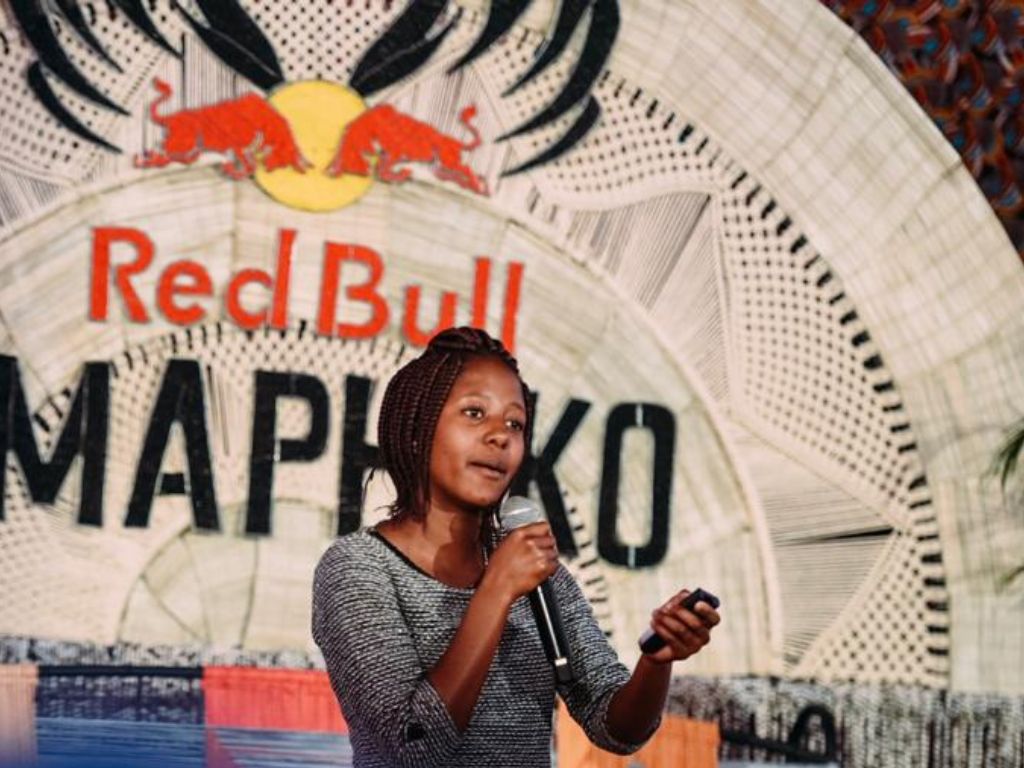
On the 27th of June, the world celebrated MSME (Micro-, Small and Medium Enterprises) day. The mere recognition of this day by the UN is confirmation that we are on track with the work we do in Diepsloot, supporting entrepreneurs. Recently, one of our participants, Nondumiso Sibiya, was accepted into the RedBull Amaphiko Academy.
The article below was written by her business partner, Sbusiso Shongwe. It tells us about her experience and how being a Wot-if? participant helped Boombadotmobi get to where they are now.
RedBull Amaphiko Academy is a global programme that champions social entrepreneurs driving positive change in their respective communities. The programme’s key focus is in developing and supporting the visions of these young eager entrepreneurs and their groundbreaking initiatives through a storytelling format.
One fortunate Social Entrepreneur who took part in the 2019 programme is Nondumiso Sibiya from Boombadotmobi, a Diepsloot-based waste management business platform that connects waste generators with waste collectors in order to facilitate responsible waste disposal. Nondumiso says the eight-day Bootcamp, which took place in Durban early this month, was a game changer.
“Entrepreneurship can be a lonely journey. Being with other social entrepreneurs under one roof, sharing similar values makes one realise that one is doing the right thing. The Bootcamp made it possible for me to be the first one in my family to fly in an airplane and stay in a 5-star hotel near the beach.”
“I love storytelling and meeting people like Saray Khumalo who recently summited Mount Everest, and South African celebrated storyteller, Gcina Mhlophe, made it all the more fun. They both shared their stories and the impact they have had in their respective communities and across the globe.”
Boombadotmobi was founded in 2017 when Nondumiso and her business partner noticed the scourge of illegal dumping in Diepsloot. Upon discovering that the waste was coming from outside Diepsloot, they quickly sought a solution to address the problem. Now they collect waste directly from the generators and redirect its final destination.
“We send pictures to our customers to assure them their waste is responsibly disposed of.” says Nondumiso.
She says starting a business is like raising a baby. A business needs the care of an understanding parent but equally important is having a supportive family structure.
“The Wot-if? Trust has been that family structure. They have seen us crawl, learning to stand, taking that first uncertain step, and learning to walk”, added Nondumiso.
She says that without the support from The Wot-if? Trust, she would not have known about the RedBull Amaphiko Academy. Being an online business platform, constant access to the internet is crucial for the success of Boombadotmobi. So is the constant need to master as many business skills as possible.
“The Wot-if? Trust has made available business skills development like Economic Literacy, record keeping, invoicing, social media master classes and others. I think doing this on my own would have cost a lot of money and taken a long time.”
just as it takes a village to raise a child, local entrepreneurs require the support of a community. By buying local products and services, you help feed a family or send a child to school or allow a one man business to grow and employ someone else.
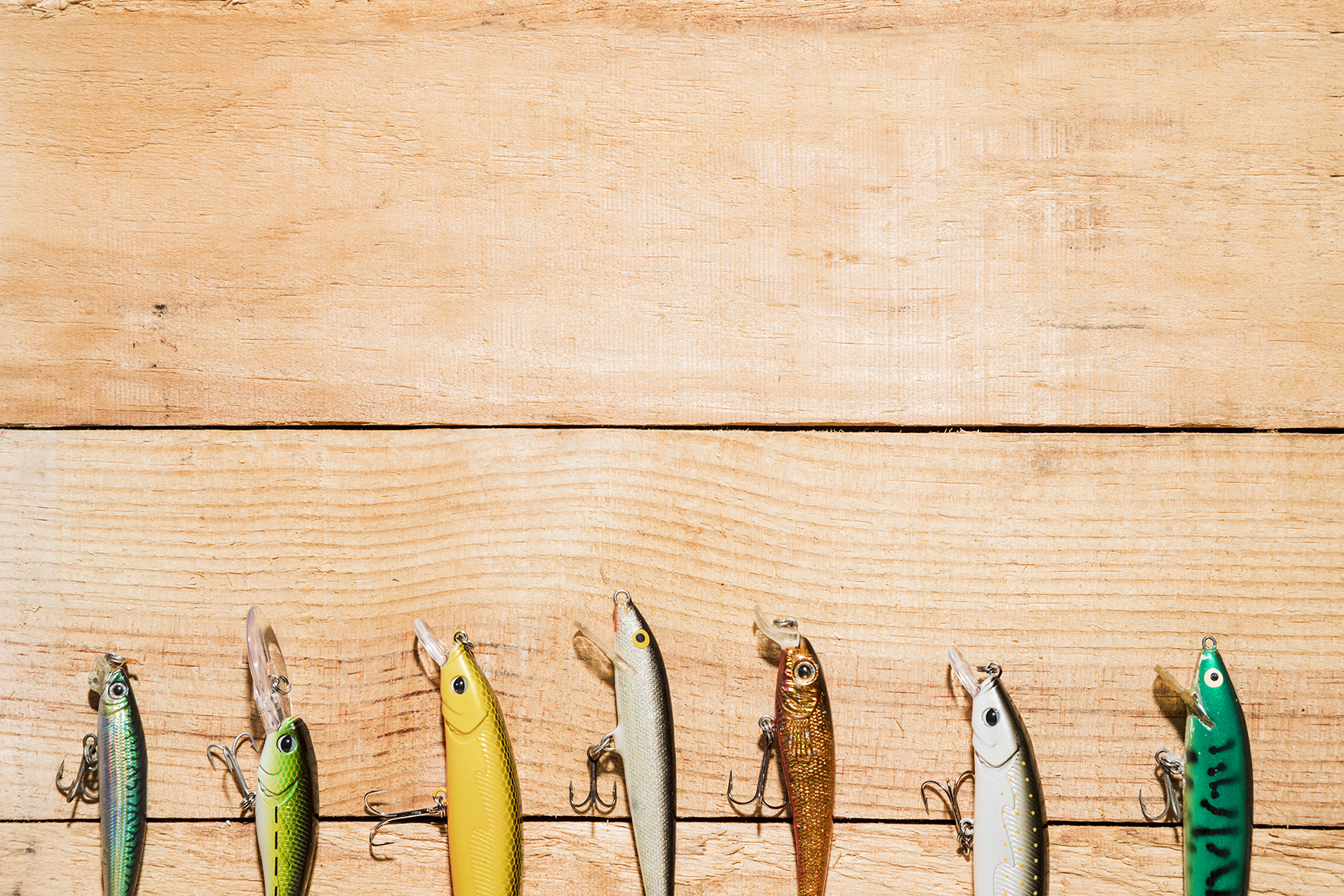
Many of our participants are what we call “necessity entrepreneurs” – being unable to find a job, they start businesses as a last resort. Entrepreneurship is no small challenge, though, and even with our assistance, it takes a long time before they are able to start earning a reasonable income with their businesses. Some of our participants have accepted employment offers. This means a steady income and working experience for them, but does it also mean the death of their businesses?
Samson is a tiler and has experience in construction. He joined the Wot-if? Trust as a participant three years ago, when he decided to start his own business, Hlabolohang Flooring. He has recently been contracted as a construction worker at the upcoming Chuma Mall in Diepsloot. He says he decided to take on the job as a new strategy. His plan is to build relationships and get to know people in the industry while on the job. Despite his previous marketing approach (persistently visiting all construction sites he came across and offering his services), he wasn’t getting where he wanted to go with his business. “I was not getting the tuna. I was only catching sardines”, he says.
Samson is also making the most of the opportunity to learn more about construction, especially flooring techniques. He’s certainly not let go of his dream or his company, and makes it clear that the construction job is part of his marketing plan.
Andile started Creative & Denim, customising denim clothing and selling vintage clothes at Riversands Market on the weekends. “I started going to the Father Louis Blondel Centre (FLBC) just to use the internet. It was only a year and a half later, after chatting with sis’ Felicety (FLBC project coordinator) that I realized how Wot-if could help me and felt inspired to start a business.”
He then landed the ‘opportunity of a lifetime’ while selling his clothes at the Riversands Market. What he thought was a potential customer turned out to be the owner of a start-up clothing label. Andile now works as the brand’s creative director, overseeing design and production.
While he’s enjoying what he’s doing right now, Andile hasn’t lost sight of his dream to have his own label. “I’m using this opportunity to learn everything I can about the business and to save. I also still do custom orders for my clients in my free time”.
Sometimes, taking a side step is the right step toward achieving your goals.
Both Samson and Andile say they wouldn’t be where they are today if it wasn’t for the Wot-if? Trust. “Just being able to use the internet and printers for free was a big help for me”, says Samson. “Using an internet café would have cost me a lot of money – money I didn’t have. All the training and workshops also helped me develop a clear vision of what I want to do.”
Andile believes that it was the chat with sis’ Felicety that gave him the push to follow his dreams.
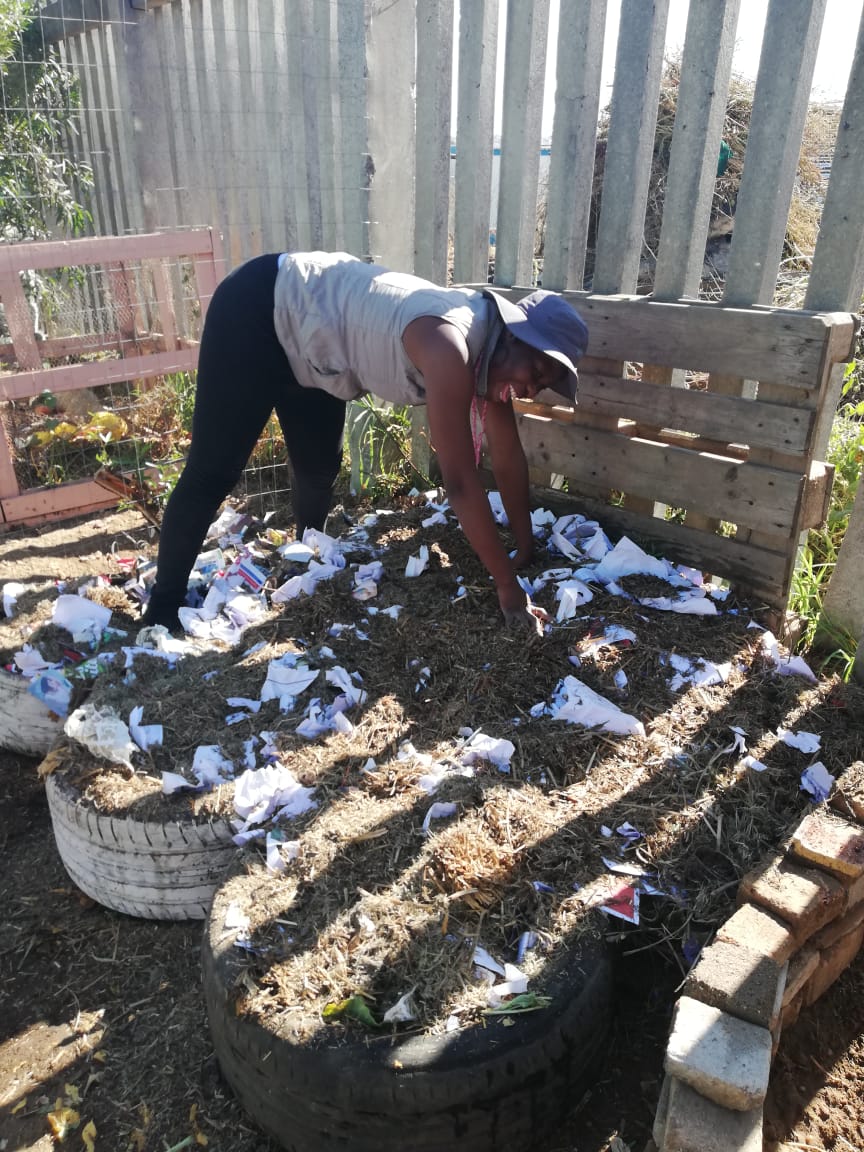
Greening and Conservation is one of our 5 key focus areas and we also encourage residents to grow their own food. We have made our grounds in Diepsloot available for vegetable gardens and tunnels, some of which are used by our Roots & Shoots kids to learn about growing food. We also support various food gardens in Diepsloot.
We are excited to announce that The Wot-if? Trust has recently entered in to a partnership with Food &Trees for Africa and Nespresso. “We’ll be using coffee grounds from used coffee pods in a pilot composting project, to enhance the soil in our various food gardens at the Father Louis Blondel Centre, and other gardens in Diepsloot”, says Rita Groenewald, our Greening and Conservation Specialist.
Various community stakeholders attended a 2-day permaculture and composting workshop in June, the first of a series to be given by Food & Trees over the next 3 months.
“Coffee grounds are excellent for composting, as the grounds assist bacteria in converting organic matter to compost, acting as an activator in the composting process”, Groenewald says. “Nespresso coffee pods are fully recyclable, and we would encourage anyone using these to find their local recycling depot to ensure both the aluminum pods and coffee grounds don’t end up in landfills.”
Groenewald advises that coffee grounds should not be sent to landfills, as they can emit high levels of methane when not composted correctly, contributing to greenhouse gas emissions.
Combining the coffee grounds with the existing composting we are already doing, should make a big difference to our soil quality, improving the yield of our food gardens that benefit participants of the precinct.
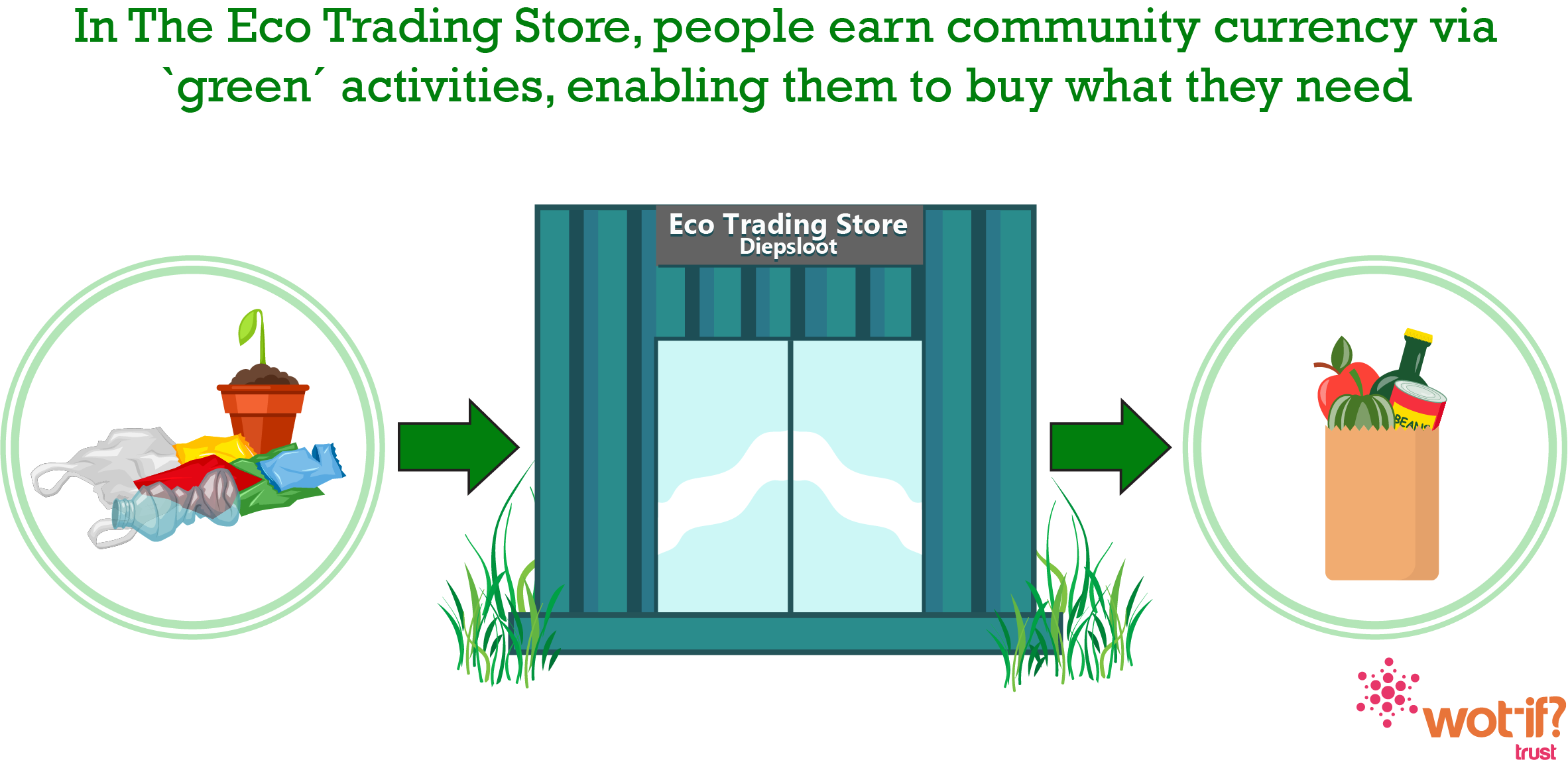
We are excited to announce that our Eco Trading Store is currently under construction! You may have heard about in the build up to Mandela Day 2019 – the Eco Trading Store is a new project that aims to reduce dependency amongst our participants.
In a community like Diepsloot, we often find that the people we work with are struggling to meet their basic needs. Part of our mandate is to help aspiring entrepreneurs develop their businesses so that they can secure an income for themselves and eventually create jobs in their community. But how can we expect people to build thriving businesses when they are hungry?
We try to help our participants as much as we can by providing soup and sandwiches on a daily basis. However, this only provides a temporary solution and is not empowering in any way.
The Eco Trading store enables people to buy what they need using a community currency, which they earn through “green” activities. They can bring in eco bricks they’ve made or seedlings they’ve grown to earn this currency. They “do something to get something”, rather than receiving handouts. This builds dignity through earning, while at the same time benefitting the community.
Using this model, we hope to develop a culture of social responsibility, self-reliance and eco-awareness. The system has already been tested with our Roots & Shoots group and has been very successful.
Keep an eye out for our Mandela day communications to find out how you can help.

On 27 April 1994, South Africa’s voting population turned out in their millions to finally take part in the country’s first truly democratic elections. Journalists came from around the world and waited with baited breath for the story to unfold. Would there be intimidation? Would there be violence? Would the vote be accepted? Could Apartheid really be at an end? The day itself was a “non-news” event, because people of all cultures and colours stood peaceably, even happily, alongside in the snaking queues. The real story lay in what South Africa achieved that day, something that seemed impossible for so many – political freedom. It was a day worthy of being commemorated. 25 years later let’s reflect on what freedom means to us now.
Is freedom merely the right to vote or is it so much more?
When I asked friends, family and colleagues to describe what freedom means to them, I was struck by the wide range of answers. Answers included the “rights to” (life, dignity, vote, speech, association, choice, movement, work, food and clean water) and the “rights from” (unlawful imprisonment, abuse, discrimination, violence, environmental harm). I realised that political emancipation is simply the first step in what is a continually evolving process. As our society matures, so does our definition of freedom.
Inequality is a massive global problem. 46% of the world lives on less than $5.50 (about R80) a day according to the World Bank. In South Africa, over half the population (30.4 million people) live in poverty. The overall unemployment rate is at 27%. Black women bear the brunt at 34%. Most alarming for the future, is half our youth population (15 to 24 years) are unemployed.
Poverty is a constant attack on one’s dignity, safety and food security. It is clear that the hopeless-helpless cycle of poverty is a denier of freedom. The growing gap between the haves and the have-nots, compounded by political and economic instability, is the biggest threat to freedom for our young democracy.
What can we do to help this situation?
When you read the stats mentioned above, this situation may seem over-whelming. It is! But perhaps each one of us can take a small step towards solving the problem. When all these small steps are compounded, they will have a huge impact. Here are some suggestions:
- Support a civil society organisation to hold our government accountable for how our taxes are spent.
- Contribute to an organisation that works in an impoverished community. Even a small amount of money or time can make a difference.
- Find out what your company does for social investment and see if you can get involved.
As we leave Freedom Month behind and enter a month that celebrates labour day and another (hopefully) free and fair election, think about the social pact you can make to help contribute towards genuine freedom for all South Africans.

Growing the Creative Economy
The creative economy has been identified as a crucial economic sector for artistic and cultural expression and a source of income, employment and livelihoods. However, participation in this sector is often limited by lack of basic business skills, networks, infrastructure and resources. The Kasi Creative Propeller aims to address these issues while fostering an inclusive creative economy in Diepsloot. The Kasi Creative Propeller will be implemented over a 10-month period in 2019.
Like most townships, Diepsloot is culturally rich but economically disadvantaged, characterised by high unemployment, poverty and inequality. Entrepreneurship is a key to solving these problems. The creative economy is a logical sector for entrepreneurship especially for youth, given their creative culture, knowledge and talents coupled with their familiarity with media and technology. Establishing and sustaining a successful creative enterprise is constrained by a host of challenges ranging from basic business fundamentals to access to technology, finance and markets. In addition, township-based creative industries tend to be fragmented and dependent on grants, limiting the cohesion and sustainability of the sector.
The Kasi Creatives Propeller is aimed at individuals and emerging and small businesses in the creative industries, which includes film, photography, graphic and web design, drawing/art, music, creative writing, animation and digital skills. It provides a solution to the everyday challenges faced by township artists that limit their ability to access and unlock economic, social and artistic value from South Africa’s growing creative economy.
We currently have 78 people signed up for various elements of this initiative. The Kasi Creative Propeller (like all our programmes) is aligned with the 6 Sustainable Development Goals we aim to impact:

Mechanisms to monetise and distribute content are imperative to unlocking value in the township economy, and mainstreaming arts and culture within it. The project addresses this problem through creative collaboration and social enterprise. This type of approach ensures that community artists (who are too often the target of failed training programmes) do not work in silos and are truly empowered to secure a livelihood based on their talents, creativity and passion for the arts.
2019 will also see the launch of the pilot phase of an online media platform that will help our creative entrepreneurs to market their skills and creative talents. A content production lab has been set up in the upstairs front container of the eHUB. A multi-purpose studio is in the pipeline.
“The creative economy is one of the most dynamic sectors of the global economy with a powerful transformative force for socio-economic development. The creative economy deals with the interface between economy, culture, technology, and social aspects. Having creativity as the main driver, the sector is concentrated around products and services bearing creative content, cultural value and market objectives. Creative goods and services are resilient products relying on ideas, knowledge, skills and the ability to seize new opportunities.” (United Nations Institute for Training and Research – UNITAR)

What does a 20% increase in revenue mean for an entrepreneur? Ask Brian Mafifi, CEO of Diepsloot Radio. In the past three months Brian has signed advertising contracts with clients like Gauteng Department of Economic Development and 1Life to the value of R250 000. And there’s more to come with some other big brand deals in the pipeline.
Operating out of the eHUB, Diepsloot Radio is an online radio platform started in 2011. The station was started with owner funds, a small loan and donations of equipment and a container. Brian enlisted the help of volunteers to help with do the radio shows. In its first year of operation the station had 500 listeners. This has grown by 90% to 5000 listeners. A number of the crew members – who gained skills and experience while working or volunteering at the station – have gone on to have successful careers at bigger stations. “We need to make a contribution to the community we operate in,” explains Brian. “We give people the opportunity to work here as volunteers and get experience. We’re very proud of those who have gone on to bigger stations and great jobs.”
The additional revenue will allow the station to buy more equipment, upgrade the studio and allocate money towards a marketing budget to grow the brand. The station currently employs 7 paid crew members.
“Being an entrepreneur is tough,” says Brian. “The support of organisations like the Wot-If? Trust and donors like Ericsson have been a big help in keeping the station alive.”

Getting invited to show at an international fashion week is a big deal for any designer. Behind the glamour of the spotlights, what does this opportunity mean for a young fashion brand?
“Walking the ramp in the fashion capital gave us a taste of success. It means we are closer to the dream of taking our brand International” says business manager, Thabang. In the 6 months since the show, their direct sales have grown by 33% and sales with their retailer, Urban Zulu, have increased by 40%.
Salva and Thabang (Alvada’s co-owners) are investing the additional revenue back into the business, with prospects to open a shop at 27 Boxes in the Johannesburg suburb of Melville.
The opportunity to go to Turin came via the Small Enterprise Development Agency (SEDA), where Salva participated in a mentorship programme. The Wot-If? Trust assisted with buying fabric to make the garments and business skills development. Thabang has also found value in the business admin and marketing workshops offered by Wot-If?
“We’ve come a long way and organisations like Wot-If? have played a big role in our success” says designer, Salva. “We’re really excited about our future. We’re looking forward to going back to Turin in 2019.”
Thabang and Salva have been running Alvada Creations for 5 years. Their shop and studio are currently located in Diepsloot Extension 2. Alvada employs 2 additional people.

On Wednesday, 18 July 2018 we presented our interpretation of Nelson Mandela Day. Every year since 2014, The Wot-If? Trust has leveraged off Nelson Mandela Day to embark on 67 Days of Digital Activism! This time ‘round, our #ActionAgainstPoverty focused on business, technology and cooking for the Diepsloot community. One hundred and fifty corporates & community members lived by Nelson’s Mandela’s “Each one, teach one” philosophy.
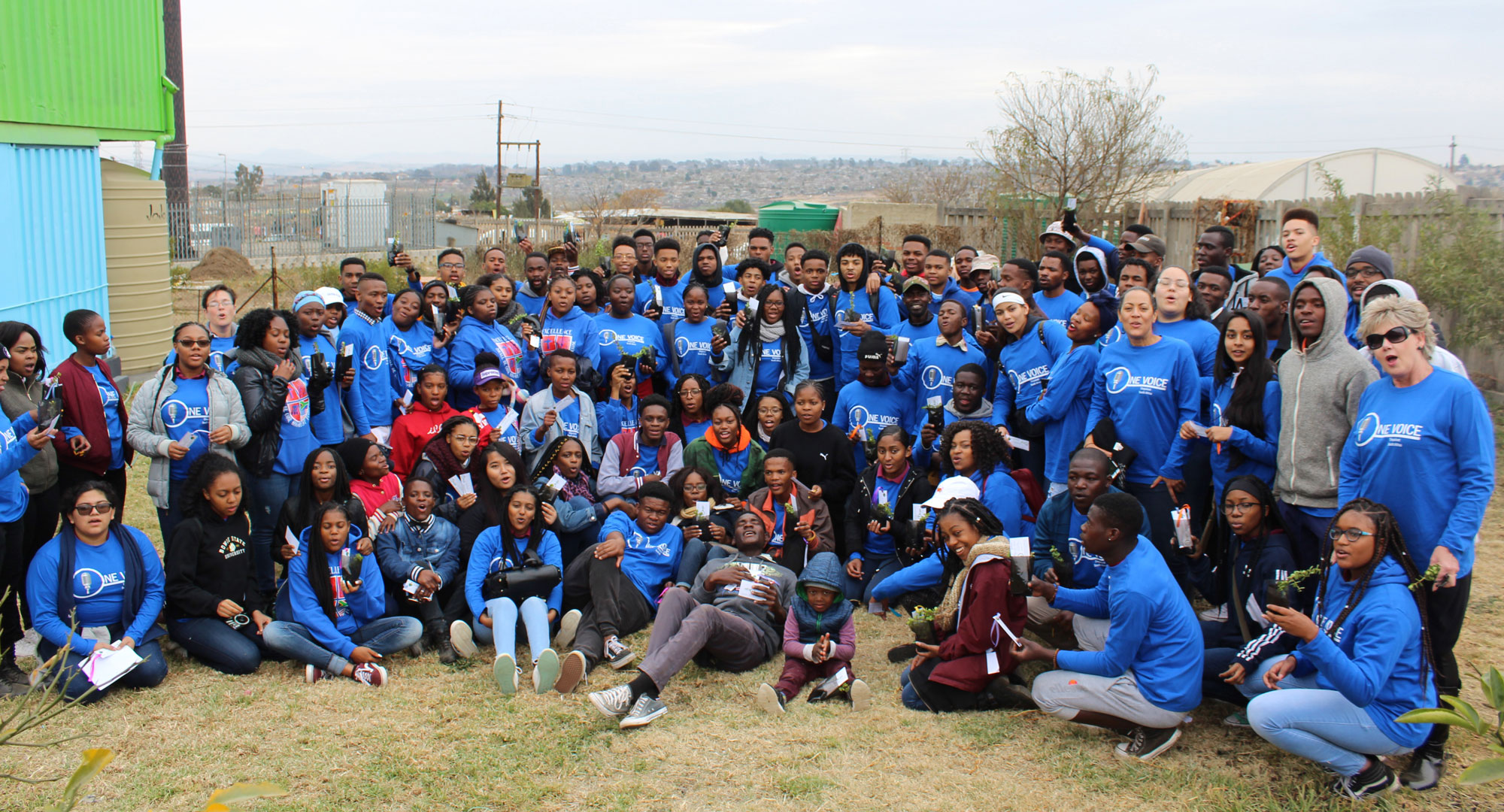
The World Choir Games from 4 – 14 July 2018 kick off in Pretoria for the first time in Africa – a competition founded in the yea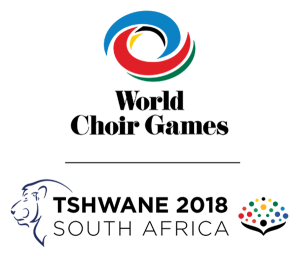 r 2000. More than 300 choirs and 16 000 participants from over 60 countries are in Tshwane to compete in the Olympic Games of Choral music. One hundred and forty-seven of the total choirs are participating in 2018 are from South Africa. The World Choir Games (in their 10th edition) feature choirs such as award-winning, Takoma Academy Chorale from Takoma Park in Maryland, USA participating in the high schools segment of the competition.
r 2000. More than 300 choirs and 16 000 participants from over 60 countries are in Tshwane to compete in the Olympic Games of Choral music. One hundred and forty-seven of the total choirs are participating in 2018 are from South Africa. The World Choir Games (in their 10th edition) feature choirs such as award-winning, Takoma Academy Chorale from Takoma Park in Maryland, USA participating in the high schools segment of the competition.

